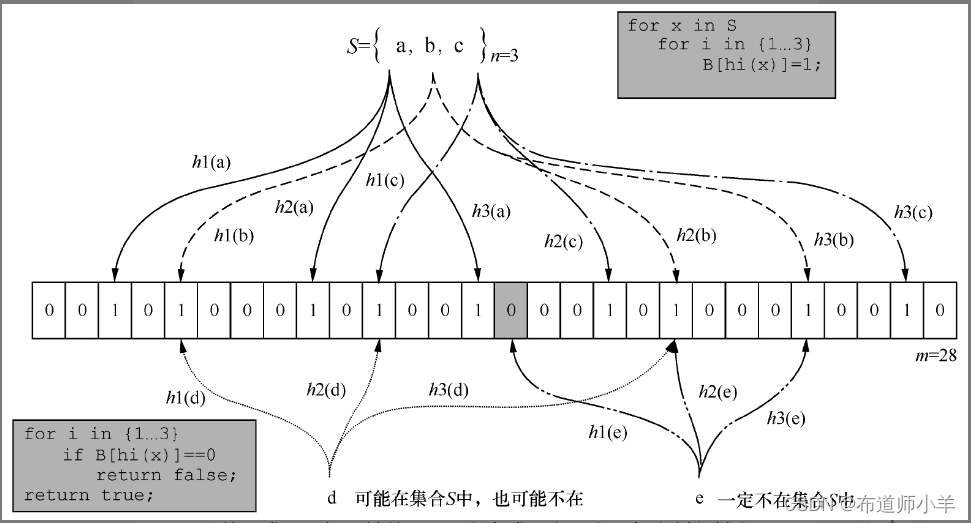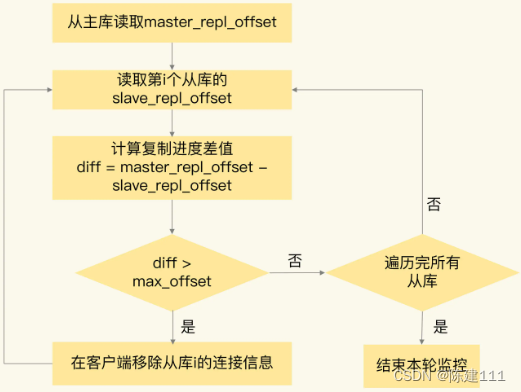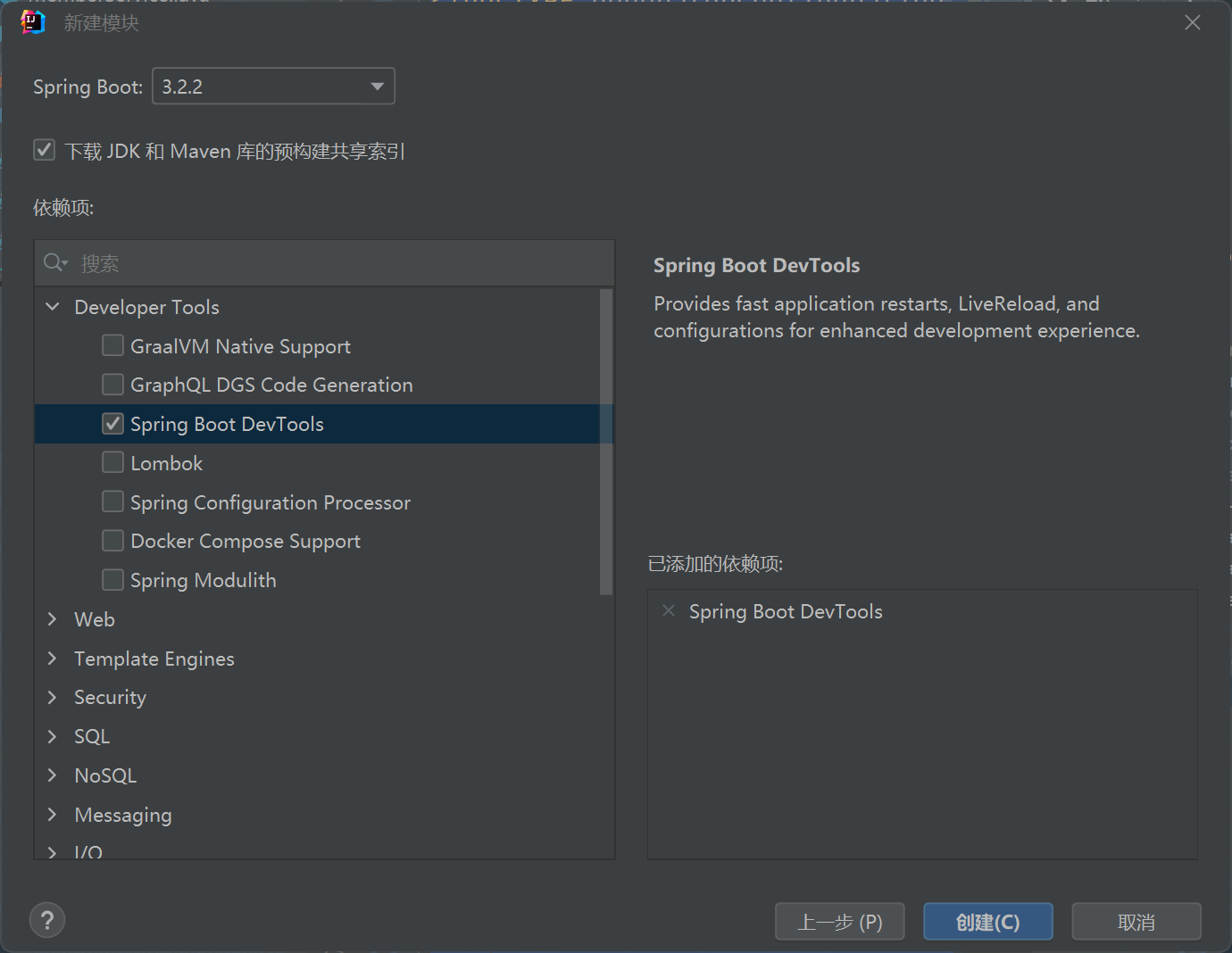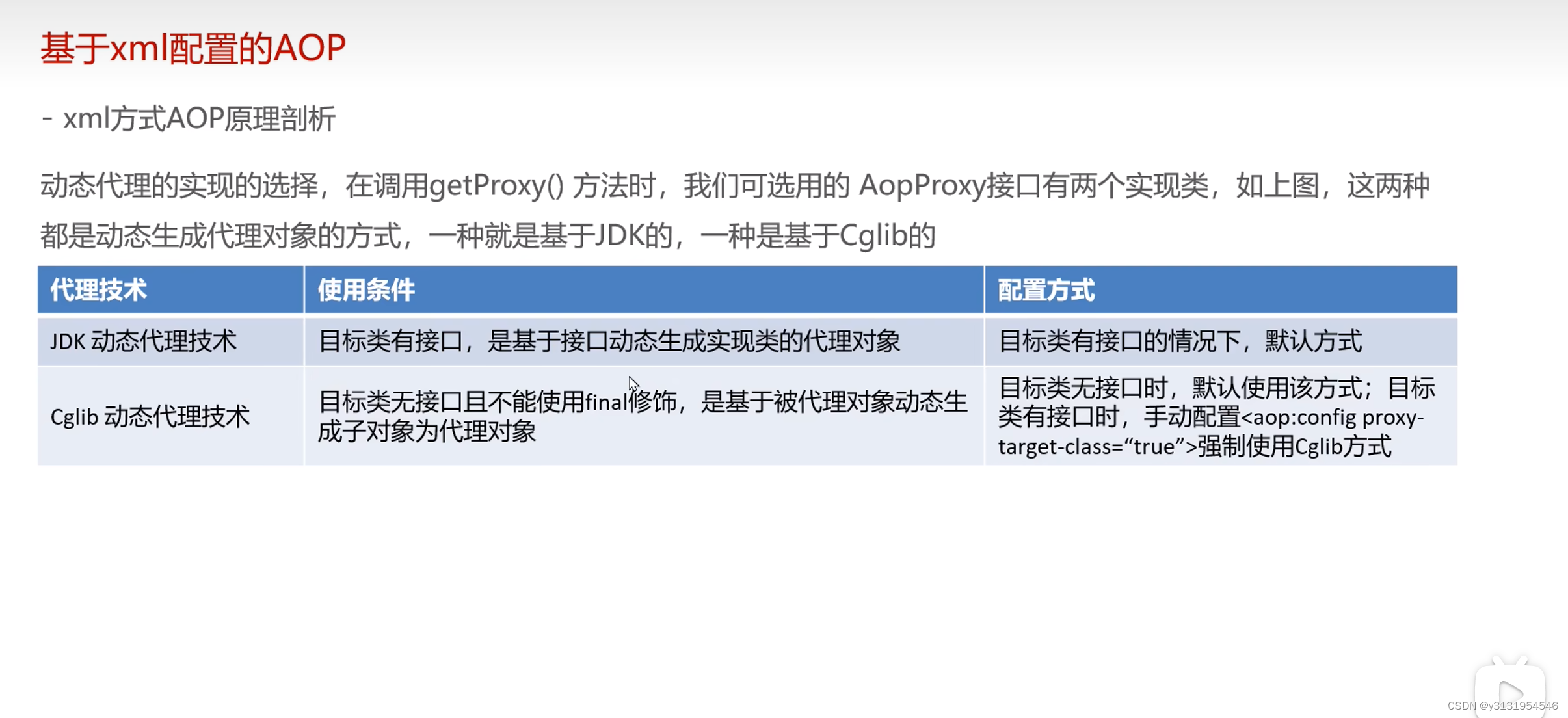SpringBoot+Redis完成数据缓存
去年今日此门中 人面桃花相映红
人面不知何处去 桃花依旧笑春风
感谢相遇!感谢自己,努力的样子很给力!
为了更多朋友看见,还是和大家说一声抱歉,限制为粉丝可见!有问题可以随时私信!我保持互不打扰,各自安好的底线,不群发,不随便私信!!!如果感觉有收获,我会替您感到高兴,这篇文章的价值也就得以体现!
但是,不要打赏!不要打赏!不要打赏!大家都是父母的血汗钱,自己挣一点也不容易!可以留着给自己加个鸡腿,给父母买点好吃的!!!我也经常兼职,深知其中不易!

1.Redis的特点
Redis将所有数据都存储在内存中,并且可以定期将数据同步到磁盘上,以保证数据的持久化。这样做的好处是内存读写速度要比硬盘快很多,大大提高了数据访问的效率。
- 简单和易用
Redis提供了简单易用的命令行接口,使得用户可以轻松地进行操作。同时,它也提供了非常完善的客户端库,使用者可以在自己的应用程序中直接调用这些库,减少代码量、提升开发效率。
- 数据结构多样化
Redis支持多种数据结构,包括字符串、列表、散列、集合和有序集合等,支持各种各样复杂的数据存储,缓存、分布式锁、消息队列等应用场景。
- 高并发性
Redis的高性能在于其采用的单线程架构,确保在单个线程运行时,数据的原子性和可靠性。
2.Redi使用场景
Redis可以用于各种类型的业务,特别是那些需要快速读写、高并发处理和数据缓存的场景。以下是一些常见的业务可以使用Redis:
3.Redis和数据库的主要区别
4.Redis的安装
由于需要通过github进行下载,不太稳定,这里我给大家下载好了,放在个人资源,免费下载!
在这个安装包里面我给大家提供了一个Redis安装包,还有一个Redis GUI可视化工具
同时,想必很多同学会遇到一些软件包下载不下载的问题,比如Hadoop,还有kafka,MySQL驱动这些的,有的同学会去搞系统,肯定也会遇到镜像下载缓慢的问题,在这里,我给大家列举几个好用的国内镜像站
对于安装的详细步骤不再赘述,由于我提供的是可视化的安装包,所以大家应该没有问题!如果想要使用压缩包的形式去安装,类似的博客极其繁多,大家随便找一个就行,大家理解!
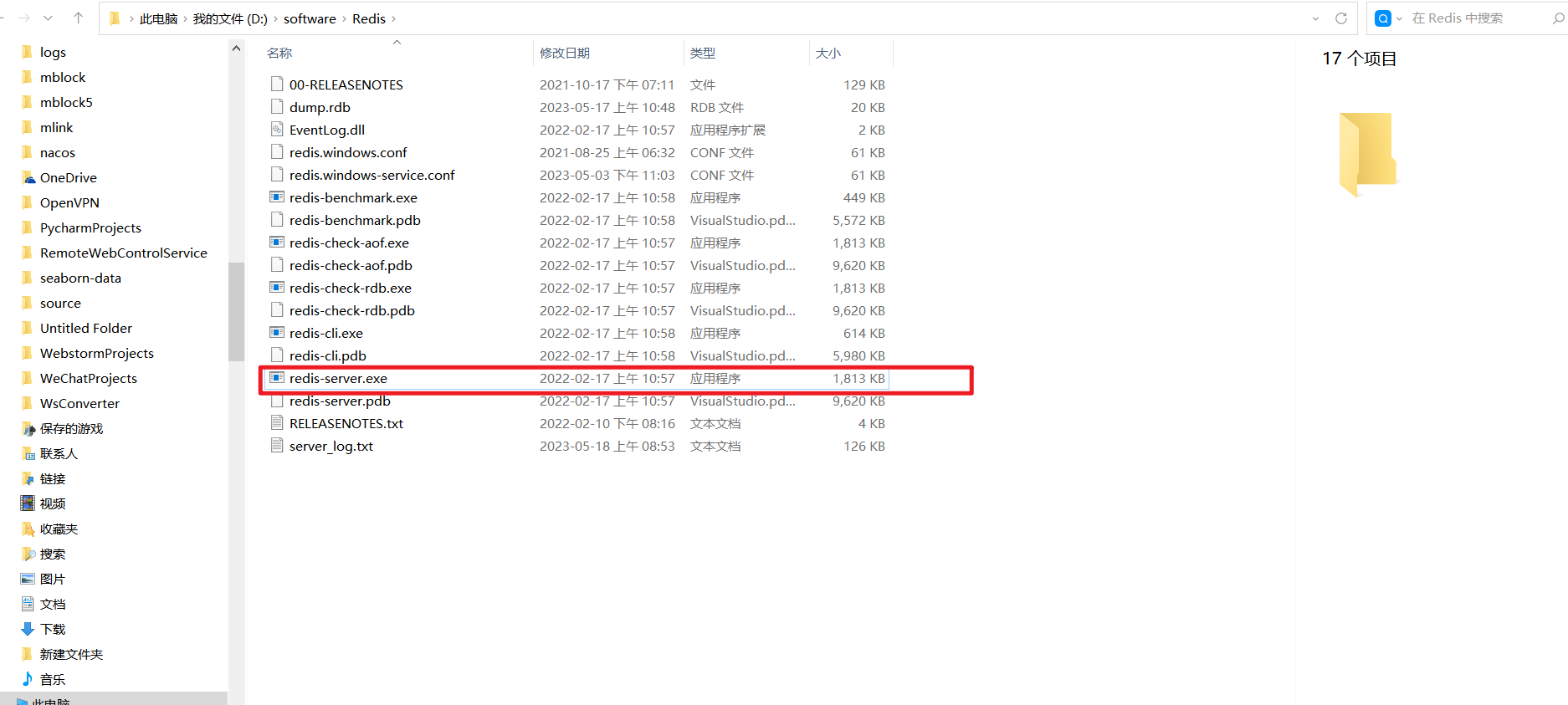
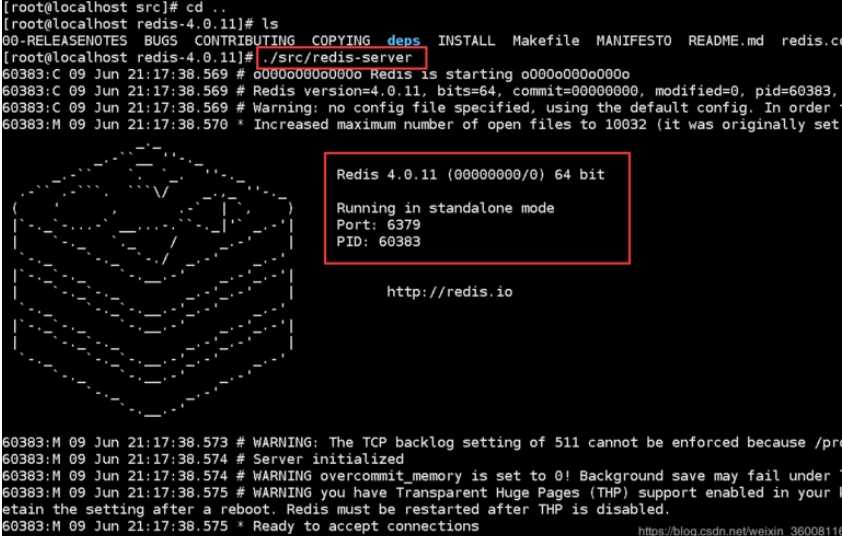
最后这里跟大家说一下,以后的项目启动中注意一下,Redis如果不是开机自启,一定要记得Redis打开,不然就会报错
默认的Redis密码为空,端口为6379,想要自定义,大家可以参考其他博客
在Redis服务器中,可以通过设置密码来加强对Redis的访问控制。以下是使用密码认证的步骤:
打开redis配置文件(一般位于/etc/redis/redis.conf),找到“requirepass“(没有请添加),
取消注释该行配置参数,将其值设置为所需密码,例如: requirepass yourpassword重启 Redis 服务使配置生效。如果是使用 systemd 管理 Redis 的,则执行 systemctl restart redis。
当客户端连接到 Redis 服务器时,要进行身份验证才能继续执行操作。可以在连接 Redis 后,
使用 AUTH 命令提供密码进行认证,例如:AUTH yourpassword注意事项:
- 如果使用了 requirepass 就需要对 Redis 进行身份验证,否则将会无法进行任何操作;
- 需要保管好密码,防止他人未经授权使用;
- 可以使用命令 config get requirepass 检查当前的 requirepass 密码设置是否正确。
在Redis中设定了密码之后,只有提供正确的密码才能操作Redis数据库,这可以提高Redis的安全性和防止未经授权的访问。
5.SpringBoot集成Redis
这里我钻的比较稍微深一点,为了给大家提供更多的学习,大家一定不要畏难,一定要脱离舒适圈,试着挑战自己,只有这样,我们才能真正
依赖引入
<dependency>
<groupId>org.springframework.boot</groupId>
<artifactId>spring-boot-starter</artifactId>
</dependency>
<dependency>
<groupId>org.springframework.boot</groupId>
<artifactId>spring-boot-starter-test</artifactId>
<scope>test</scope>
</dependency>
<!--springBoot集成redis-->
<dependency>
<groupId>org.springframework.boot</groupId>
<artifactId>spring-boot-starter-data-redis</artifactId>
<version>2.5.4</version>
</dependency>
<dependency>
<groupId>org.springframework.boot</groupId>
<artifactId>spring-boot-starter-web</artifactId>
<version>2.5.4</version>
</dependency>
<dependency>
<groupId>org.projectlombok</groupId>
<artifactId>lombok</artifactId>
<version>1.18.20</version>
<optional>true</optional>
</dependency>
<dependency>
<groupId>org.springframework.boot</groupId>
<artifactId>spring-boot-starter-test</artifactId>
<version>2.5.4</version>
<scope>test</scope>
</dependency>
<dependency>
<groupId>org.springframework.boot</groupId>
<artifactId>spring-boot-autoconfigure</artifactId>
<version>2.5.4</version>
</dependency>
<dependency>
<groupId>com.alibaba</groupId>
<artifactId>fastjson</artifactId>
<version>1.2.75</version>
</dependency>
<dependency>
<groupId>org.springframework.boot</groupId>
<artifactId>spring-boot-starter-aop</artifactId>
</dependency>
每次想到好东西,都想给大家分享一下,这里也多给了大家几个依赖,做一个简单的小介绍
spring-boot-starter: 提供Spring Boot应用程序的核心功能和依赖关系,包括自动配置、运行时上下文等。
spring-boot-starter-test: 提供用于测试的Spring Boot应用程序的核心功能和依赖关系,包括自动配置、运行时上下文等。
lombok: Lombok库,提供了简化Java代码的注解,如@Getter、@Setter、@AllArgsConstructor、@NoArgsConstructor等。
spring-boot-starter-test: 提供用于测试的Spring Boot应用程序的核心功能和依赖关系,包括自动配置、运行时上下文等。
spring-boot-starter-aop:该依赖是Spring Boot框架的一个starter依赖,提供了Spring AOP的支持。AOP(Aspect-Oriented Programming)面向切面编程,是一种程序设计思想,它将程序中的横切关注点(如日志、安全、事务等)从业务逻辑中分离出来,以增加代码的可维护性和灵活性。在Spring Boot中,通过引入spring-boot-starter-aop依赖,可以轻松地使用AOP来实现各种功能。

yml文件进行配置Redis
server:
port: 8080
spring:
redis:
database: 0
host: 127.0.0.1
password:
port: 6379
timeout: 1800000
pool:
max-active: 20
max-idle: 5
max-wait: -1
min-idle: 0
这是一个 YAML 格式的配置文件,主要用于 Spring Boot 项目的服务器以及 Redis 数据库连接配置。文件中包含以下信息:
spring.redis.host: Redis 服务器地址,即本地 IP 地址。默认值为 127.0.0.1,表示连接本机上安装的Redis服务。如果Redis服务位于其他server,则需要相应更改IP地址。
spring.redis.password: Redis服务器密码,可以为空。如果设置了Redis密码,则在应用程序中访问Redis实例时需要输入密码验证身份。
spring.redis.timeout: Redis服务器连接超时时间,单位是毫秒。在此 1800000 表示连接 Redis 服务器最大等待时间为 30 分钟。
spring.redis.pool.max–wait:连接池最长等待时间,单位是毫秒,当达到连接池的最大容量时,新的请求进来会一直等待,直到有一个空闲的 Jedis 实例被返回。
spring.redis.pool.min-idle:连接池最小空闲数,表示池中保留的最少空闲实例数。如果启用了非阻塞连接池(如默认使用 commons-pool2),则此属性无效。
在 Spring Boot 项目中,开发人员可以通过在 application.yml 文件中配置Redis参数,并使用SpringBoot提供的RedisTemplate快速链接和操作 Redis 数据库。
编写Redis配置类(可以其他项目随便复用,值得收藏)
此处主要是进行Redis序列化
Redis需要序列化是因为其底层是基于内存的,而内存中存储的数据必须以二进制的形式表示。当需要将某个对象保存到Redis中或从Redis中取出时,需要将该对象进行序列化(即将其转换成字符串或二进制数据),使其可以在Redis中进行存储和传输。在Redis中,常用的序列化方式有字符串序列化、JSON序列化、MessagePack序列化等。不同的序列化方式对于不同的应用场景具有不同的优劣势,开发者需要根据自己的实际情况选择合适的序列化方式。
package com.example.demo0013.config;
import com.fasterxml.jackson.annotation.JsonAutoDetect;
import com.fasterxml.jackson.annotation.PropertyAccessor;
import com.fasterxml.jackson.databind.ObjectMapper;
import org.springframework.context.annotation.Bean;
import org.springframework.context.annotation.Configuration;
import org.springframework.data.redis.cache.RedisCacheConfiguration;
import org.springframework.data.redis.cache.RedisCacheManager;
import org.springframework.data.redis.connection.RedisConnectionFactory;
import org.springframework.data.redis.core.RedisTemplate;
import org.springframework.data.redis.serializer.Jackson2JsonRedisSerializer;
import org.springframework.data.redis.serializer.RedisSerializationContext;
import org.springframework.data.redis.serializer.RedisSerializer;
import org.springframework.data.redis.serializer.StringRedisSerializer;
import java.time.Duration;
/**
* @Description Spring Boot 2.X版本自定义序列化方式
* @Author IT小辉同学
* @Date 2023/05/19
*/
@Configuration
public class RedisConfig {
/**
* 定制Redis API模板RedisTemplate
* @param redisConnectionFactory
* @return
*/
@Bean
public RedisTemplate<Object, Object> redisTemplate(RedisConnectionFactory redisConnectionFactory) {
RedisTemplate<Object, Object> template = new RedisTemplate();
template.setConnectionFactory(redisConnectionFactory);
// 使用JSON格式序列化对象,对缓存数据key和value进行转换
Jackson2JsonRedisSerializer jacksonSeial = new Jackson2JsonRedisSerializer(Object.class);
// 解决查询缓存转换异常的问题
ObjectMapper om = new ObjectMapper();
// 指定要序列化的域,field,get和set,以及修饰符范围,ANY是都有包括private和public
om.setVisibility(PropertyAccessor.ALL, JsonAutoDetect.Visibility.ANY);
// 指定序列化输入的类型,类必须是非final修饰的,final修饰的类,比如String,Integer等会跑出异常
om.enableDefaultTyping(ObjectMapper.DefaultTyping.NON_FINAL);
jacksonSeial.setObjectMapper(om);
// 设置RedisTemplate模板API的序列化方式为JSON
template.setDefaultSerializer(jacksonSeial);
return template;
}
/**
* 定制Redis缓存管理器RedisCacheManager,实现自定义序列化并设置缓存时效
* @param redisConnectionFactory
* @return
*/
@Bean
public RedisCacheManager cacheManager(RedisConnectionFactory redisConnectionFactory) {
// 分别创建String和JSON格式序列化对象,对缓存数据key和value进行转换
RedisSerializer<String> strSerializer = new StringRedisSerializer();
Jackson2JsonRedisSerializer jacksonSeial = new Jackson2JsonRedisSerializer(Object.class);
// 解决查询缓存转换异常的问题
ObjectMapper om = new ObjectMapper();
om.setVisibility(PropertyAccessor.ALL, JsonAutoDetect.Visibility.ANY);
om.enableDefaultTyping(ObjectMapper.DefaultTyping.NON_FINAL);
jacksonSeial.setObjectMapper(om);
// 定制缓存数据序列化方式及时效
RedisCacheConfiguration config = RedisCacheConfiguration.defaultCacheConfig()
.entryTtl(Duration.ofDays(1)) // 设置缓存有效期为1天
.serializeKeysWith(RedisSerializationContext.SerializationPair.fromSerializer(strSerializer))
.serializeValuesWith(RedisSerializationContext.SerializationPair.fromSerializer(jacksonSeial))
.disableCachingNullValues(); // 对空数据不进行缓存
RedisCacheManager cacheManager = RedisCacheManager.builder(redisConnectionFactory).cacheDefaults(config).build();
return cacheManager;
}
}
编写Redis工具类(可以其他项目随便复用,值得收藏)
致敬!!!
此处借用!!!
https://blog.csdn.net/weixin_43657300/article/details/126051333
package com.example.demo0013.utils;
import lombok.extern.slf4j.Slf4j;
import org.springframework.beans.factory.annotation.Autowired;
import org.springframework.data.redis.core.RedisTemplate;
import org.springframework.stereotype.Component;
import org.springframework.util.CollectionUtils;
import javax.annotation.Resource;
import java.util.List;
import java.util.Map;
import java.util.Set;
import java.util.concurrent.TimeUnit;
@Component
@Slf4j
public class RedisUtils {
@Resource
private RedisTemplate redisTemplate;
/**
* 指定缓存失效时间
*
* @param key 键
* @param time 时间(秒)
* @return
*/
public boolean expire(String key, long time) {
try {
if (time > 0) {
redisTemplate.expire(key, time, TimeUnit.SECONDS);
}
return true;
} catch (Exception e) {
log.error("指定缓存失效时间出现异常 error {} e {}", e.getMessage(), e);
return false;
}
}
/**
* 根据key 获取过期时间
*
* @param key 键 不能为null
* @return 时间(秒) 返回0代表为永久有效
*/
public long getExpire(String key) {
return redisTemplate.getExpire(key, TimeUnit.SECONDS);
}
/**
* 判断key是否存在
*
* @param key 键
* @return true 存在 false不存在
*/
public boolean hasKey(String key) {
try {
return redisTemplate.hasKey(key);
} catch (Exception e) {
log.error("判断key是否存在 error {} e {}", e.getMessage(), e);
return false;
}
}
/**
* 删除缓存
*
* @param key 可以传一个值 或多个
*/
@SuppressWarnings("unchecked")
public void del(String... key) {
if (key != null && key.length > 0) {
if (key.length == 1) {
redisTemplate.delete(key[0]);
} else {
redisTemplate.delete(CollectionUtils.arrayToList(key));
}
}
}
/* String */
/**
* 普通缓存获取
*
* @param key 键
* @return 值
*/
public Object get(String key) {
return key == null ? null : redisTemplate.opsForValue().get(key);
}
/**
* 普通缓存放入
*
* @param key 键
* @param value 值
* @return true成功 false失败
*/
public boolean set(String key, Object value) {
try {
redisTemplate.opsForValue().set(key, value);
return true;
} catch (Exception e) {
log.error("普通缓存放入 error {} e {}", e.getMessage(), e);
return false;
}
}
/**
* 普通缓存放入并设置时间
*
* @param key 键
* @param value 值
* @param time 时间(秒) time要大于0 如果time小于等于0 将设置无限期
* @return true成功 false 失败
*/
public boolean set(String key, Object value, long time) {
try {
if (time > 0) {
redisTemplate.opsForValue().set(key, value, time, TimeUnit.SECONDS);
} else {
set(key, value);
}
return true;
} catch (Exception e) {
log.error("普通缓存放入并设置时间 出现异常 error {} e {}", e.getMessage(), e);
return false;
}
}
/**
* 递增
*
* @param key 键
* @param delta 要增加几(大于0)
* @return
*/
public long incr(String key, long delta) {
if (delta < 0) {
throw new RuntimeException("递增因子必须大于0");
}
return redisTemplate.opsForValue().increment(key, delta);
}
/**
* 递减
*
* @param key 键
* @param delta 要减少几(小于0)
* @return
*/
public long decr(String key, long delta) {
if (delta < 0) {
throw new RuntimeException("递减因子必须大于0");
}
return redisTemplate.opsForValue().increment(key, -delta);
}
/* Map */
/**
* HashGet
*
* @param key 键 不能为null
* @param item 项 不能为null
* @return 值
*/
public Object hget(String key, String item) {
return redisTemplate.opsForHash().get(key, item);
}
/**
* 获取hashKey对应的所有键值
*
* @param key 键
* @return 对应的多个键值
*/
public Map<Object, Object> hmget(String key) {
return redisTemplate.opsForHash().entries(key);
}
/**
* HashSet
*
* @param key 键
* @param map 对应多个键值
* @return true 成功 false 失败
*/
public boolean hmset(String key, Map<String, Object> map) {
try {
redisTemplate.opsForHash().putAll(key, map);
return true;
} catch (Exception e) {
log.error("error {} e {}", e.getMessage(), e);
return false;
}
}
/**
* HashSet 并设置时间
*
* @param key 键
* @param map 对应多个键值
* @param time 时间(秒)
* @return true成功 false失败
*/
public boolean hmset(String key, Map<String, Object> map, long time) {
try {
redisTemplate.opsForHash().putAll(key, map);
if (time > 0) {
expire(key, time);
}
return true;
} catch (Exception e) {
log.error("HashSet设置时间 出现异常 error {} e {}", e.getMessage(), e);
return false;
}
}
/**
* 向一张hash表中放入数据,如果不存在将创建
*
* @param key 键
* @param item 项
* @param value 值
* @return true 成功 false失败
*/
public boolean hset(String key, String item, Object value) {
try {
redisTemplate.opsForHash().put(key, item, value);
return true;
} catch (Exception e) {
log.error("向一张hash表中放入数据,如果不存在将创建 出现异常 error {} e {}", e.getMessage(), e);
return false;
}
}
/**
* 向一张hash表中放入数据,如果不存在将创建
*
* @param key 键
* @param item 项
* @param value 值
* @param time 时间(秒) 注意:如果已存在的hash表有时间,这里将会替换原有的时间
* @return true 成功 false失败
*/
public boolean hset(String key, String item, Object value, long time) {
try {
redisTemplate.opsForHash().put(key, item, value);
if (time > 0) {
expire(key, time);
}
return true;
} catch (Exception e) {
log.error("向一张hash表中放入数据,如果不存在将创建 出现异常 error {} e {}", e.getMessage(), e);
return false;
}
}
/**
* 删除hash表中的值
*
* @param key 键 不能为null
* @param item 项 可以使多个 不能为null
*/
public void hdel(String key, Object... item) {
redisTemplate.opsForHash().delete(key, item);
}
/**
* 判断hash表中是否有该项的值
*
* @param key 键 不能为null
* @param item 项 不能为null
* @return true 存在 false不存在
*/
public boolean hHasKey(String key, String item) {
return redisTemplate.opsForHash().hasKey(key, item);
}
/**
* hash递增 如果不存在,就会创建一个 并把新增后的值返回
*
* @param key 键
* @param item 项
* @param by 要增加几(大于0)
* @return
*/
public double hincr(String key, String item, double by) {
return redisTemplate.opsForHash().increment(key, item, by);
}
/**
* hash递减
*
* @param key 键
* @param item 项
* @param by 要减少记(小于0)
* @return
*/
public double hdecr(String key, String item, double by) {
return redisTemplate.opsForHash().increment(key, item, -by);
}
/* Set */
/**
* 根据key获取Set中的所有值
*
* @param key 键
* @return
*/
public Set<Object> sGet(String key) {
try {
return redisTemplate.opsForSet().members(key);
} catch (Exception e) {
log.error("根据key获取Set中的所有值 出现异常 error {} e {}", e.getMessage(), e);
return null;
}
}
/**
* 根据value从一个set中查询,是否存在
*
* @param key 键
* @param value 值
* @return true 存在 false不存在
*/
public boolean sHasKey(String key, Object value) {
try {
return redisTemplate.opsForSet().isMember(key, value);
} catch (Exception e) {
log.error("根据value从一个set中查询,是否存在 出现异常 error {} e {}", e.getMessage(), e);
return false;
}
}
/**
* 将数据放入set缓存
*
* @param key 键
* @param values 值 可以是多个
* @return 成功个数
*/
public long sSet(String key, Object... values) {
try {
return redisTemplate.opsForSet().add(key, values);
} catch (Exception e) {
log.error("将数据放入set缓存 出现异常 error {} e {}", e.getMessage(), e);
return 0;
}
}
/**
* 将set数据放入缓存
*
* @param key 键
* @param time 时间(秒)
* @param values 值 可以是多个
* @return 成功个数
*/
public long sSetAndTime(String key, long time, Object... values) {
try {
Long count = redisTemplate.opsForSet().add(key, values);
if (time > 0) {
expire(key, time);
}
return count;
} catch (Exception e) {
log.error("将set数据放入缓存 出现异常 error {} e {}", e.getMessage(), e);
return 0;
}
}
/**
* 获取set缓存的长度
*
* @param key 键
* @return
*/
public long sGetSetSize(String key) {
try {
return redisTemplate.opsForSet().size(key);
} catch (Exception e) {
log.error("获取set缓存的长度 出现异常 error {} e {}", e.getMessage(), e);
return 0;
}
}
/**
* 移除值为value的
*
* @param key 键
* @param values 值 可以是多个
* @return 移除的个数
*/
public long setRemove(String key, Object... values) {
try {
Long count = redisTemplate.opsForSet().remove(key, values);
return count;
} catch (Exception e) {
log.error("移除值为value的 出现异常 error {} e {}", e.getMessage(), e);
return 0;
}
}
/* List */
/**
* 获取list缓存的内容
*
* @param key 键
* @param start 开始
* @param end 结束 0 到 -1代表所有值
* @return
*/
public List<Object> lGet(String key, long start, long end) {
try {
return redisTemplate.opsForList().range(key, start, end);
} catch (Exception e) {
log.error("获取list缓存的内容 出现异常 error {} e {}", e.getMessage(), e);
return null;
}
}
/**
* 获取list缓存的长度
*
* @param key 键
* @return
*/
public long lGetListSize(String key) {
try {
return redisTemplate.opsForList().size(key);
} catch (Exception e) {
log.error("获取list缓存的长度 出现异常 error {} e {}", e.getMessage(), e);
return 0;
}
}
/**
* 通过索引 获取list中的值
*
* @param key 键
* @param index 索引 index>=0时, 0 表头,1 第二个元素,依次类推;index<0时,-1,表尾,-2倒数第二个元素,依次类推
* @return
*/
public Object lGetIndex(String key, long index) {
try {
return redisTemplate.opsForList().index(key, index);
} catch (Exception e) {
log.error("通过索引 获取list中的值 出现异常 error {} e {}", e.getMessage(), e);
return null;
}
}
/**
* 将list放入缓存
*
* @param key 键
* @param value 值
* @return
*/
public boolean lSet(String key, Object value) {
try {
redisTemplate.opsForList().rightPush(key, value);
return true;
} catch (Exception e) {
log.error("将list放入缓存 出现异常 error {} e {}", e.getMessage(), e);
return false;
}
}
/**
* 将list放入缓存
*
* @param key 键
* @param value 值
* @param time 时间(秒)
* @return
*/
public boolean lSet(String key, Object value, long time) {
try {
redisTemplate.opsForList().rightPush(key, value);
if (time > 0) {
expire(key, time);
}
return true;
} catch (Exception e) {
log.error("将list放入缓存 出现异常 error {} e {}", e.getMessage(), e);
return false;
}
}
/**
* 将list放入缓存
*
* @param key 键
* @param value 值
* @return
*/
public boolean lSet(String key, List<Object> value) {
try {
redisTemplate.opsForList().rightPushAll(key, value);
return true;
} catch (Exception e) {
log.error("将list放入缓存 出现异常 error {} e {}", e.getMessage(), e);
return false;
}
}
/**
* 将list放入缓存
*
* @param key 键
* @param value 值
* @param time 时间(秒)
* @return
*/
public boolean lSet(String key, List<Object> value, long time) {
try {
redisTemplate.opsForList().rightPushAll(key, value);
if (time > 0) {
expire(key, time);
}
return true;
} catch (Exception e) {
log.error("将list放入缓存 出现异常 error {} e {}", e.getMessage(), e);
return false;
}
}
/**
* 根据索引修改list中的某条数据
*
* @param key 键
* @param index 索引
* @param value 值
* @return
*/
public boolean lUpdateIndex(String key, long index, Object value) {
try {
redisTemplate.opsForList().set(key, index, value);
return true;
} catch (Exception e) {
log.error("根据索引修改list中的某条数据 出现异常 error {} e {}", e.getMessage(), e);
return false;
}
}
/**
* 移除N个值为value
*
* @param key 键
* @param count 移除多少个
* @param value 值
* @return 移除的个数
*/
public long lRemove(String key, long count, Object value) {
try {
Long remove = redisTemplate.opsForList().remove(key, count, value);
return remove;
} catch (Exception e) {
log.error("移除N个值为value 出现异常 error {} e {}", e.getMessage(), e);
return 0;
}
}
}
编写Redis切面类(可以其他项目随便复用,值得收藏)
package com.example.demo009.config;
import lombok.extern.slf4j.Slf4j;
import org.aspectj.lang.ProceedingJoinPoint;
import org.aspectj.lang.annotation.Around;
import org.aspectj.lang.annotation.Aspect;
import org.aspectj.lang.annotation.Pointcut;
/**
* @Description Redis切面类
* @Author IT小辉同学
* @Date 2023/05/19
*/
@Aspect
@Slf4j
public class RedisAspect {
@Pointcut("execution(* com.example.demo0013.utils.*(..))")
public void pointcut(){
}
@Around("pointcut()")
public Object handleException(ProceedingJoinPoint joinPoint){
Object result = null;
try {
result= joinPoint.proceed();
} catch (Throwable throwable) {
log.error("Redis似乎出现了某些不可违因素");
}
return result;
}
}
6.测试Redis
package com.example.demo0013;
import com.example.demo0013.utils.RedisUtils;
import org.junit.jupiter.api.Test;
import org.springframework.beans.factory.annotation.Autowired;
import org.springframework.boot.test.context.SpringBootTest;
import org.springframework.data.redis.core.RedisTemplate;
import javax.annotation.Resource;
import javax.xml.ws.soap.Addressing;
@SpringBootTest
class Demo0013ApplicationTests {
@Resource
private RedisUtils redisUtils;
@Test
public void saveValue() {
//存入Redis
redisUtils.set("username", "IT小辉同学");
System.out.println("保存成功!!!");
//根据key取出
String username = (String) redisUtils.get("username");
System.out.println("username="+username);
}
}
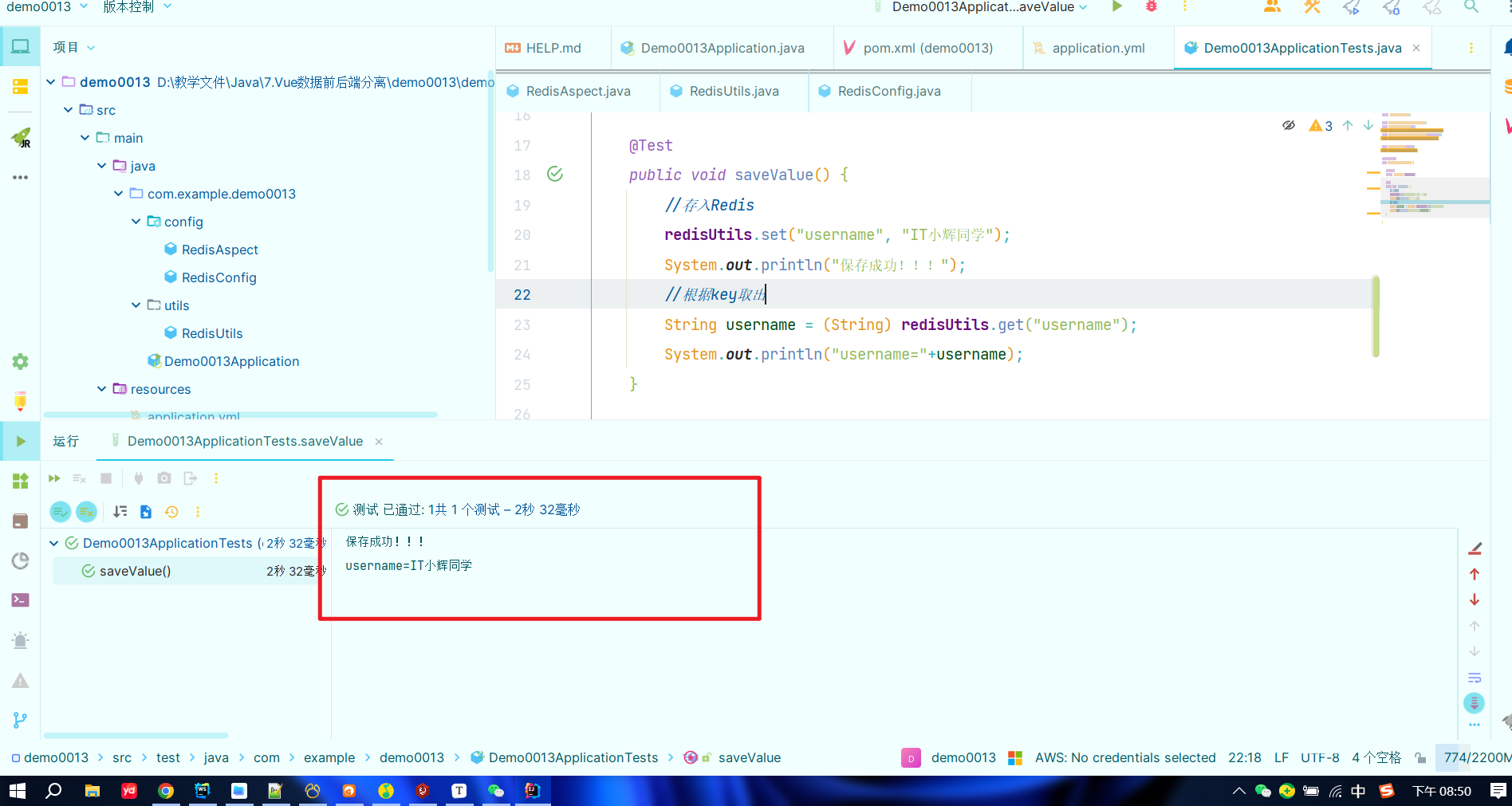
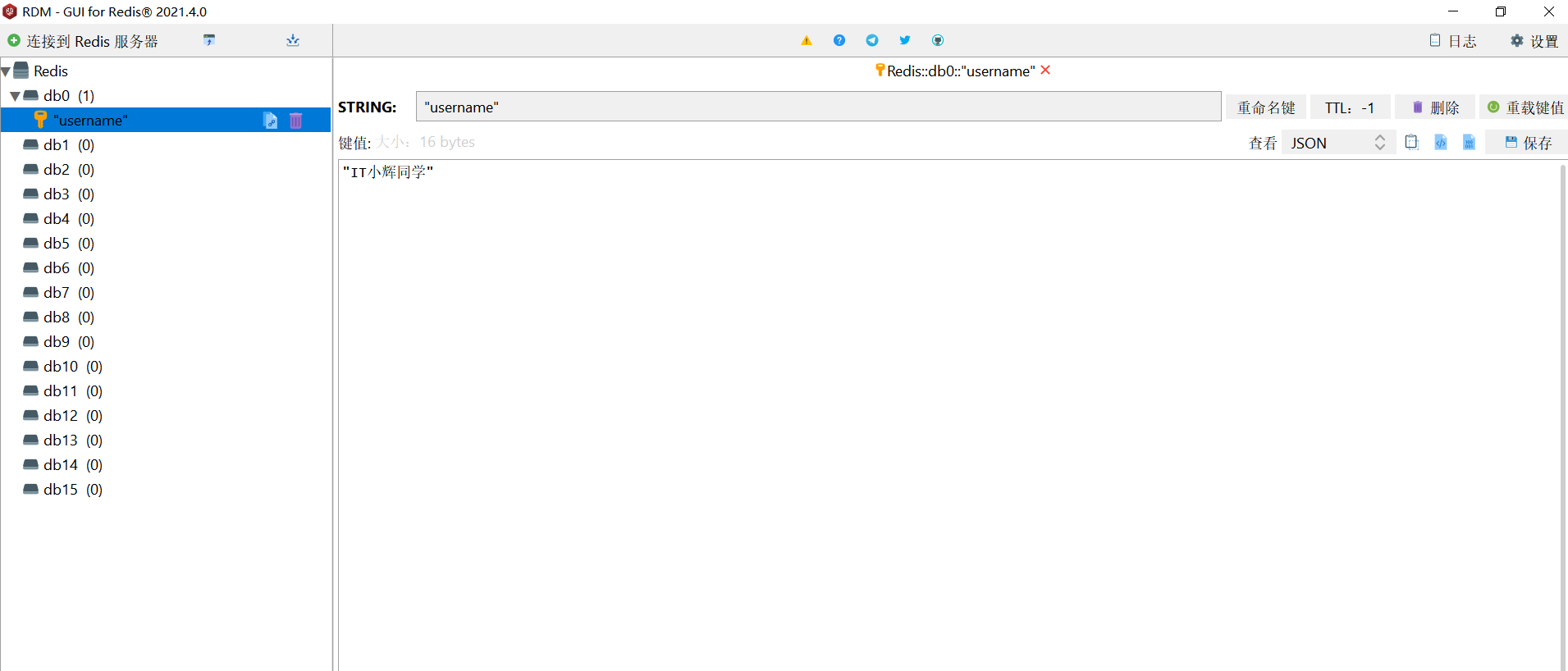
这里我们就算全部完成,有朋友可能会问,怎么定时过期或者删除,这些工具类里面都有体现,大家去看一下直接使用就行!
此处稍微列举
public boolean expire(String key, long time) { try { if (time > 0) { redisTemplate.expire(key, time, TimeUnit.SECONDS); } return true; } catch (Exception e) { log.error("指定缓存失效时间出现异常 error {} e {}", e.getMessage(), e); return false; } }删除缓存
public void del(String... key) { if (key != null && key.length > 0) { if (key.length == 1) { redisTemplate.delete(key[0]); } else { redisTemplate.delete(CollectionUtils.arrayToList(key)); } } }
最后,和大家唠个嗑
有时候,感觉很简单,但是去做,往往很难,有一些莫名的问题就会陷入无止境的恶性循环,我在写这篇文章的时候,就陷入了两个小时的坑,有时候,想要借众家之长,但是往往个性化的原因,导致不兼容的问题,所以就产生莫名奇妙的问题,大家以后如果借鉴了多人,一定要理清思路,不可拿来就用,这样会出问题,很难解决!
最后,感谢大家的认可,虽然做不了大型开源项目,但是在这里和大家分享,也是很快乐,我们一起进步!加油!不要感叹时遇不济,我们撸起袖子加油干,相信,努力一定会被认可!!!
原文地址:https://blog.csdn.net/weixin_53742691/article/details/130774685
本文来自互联网用户投稿,该文观点仅代表作者本人,不代表本站立场。本站仅提供信息存储空间服务,不拥有所有权,不承担相关法律责任。
如若转载,请注明出处:http://www.7code.cn/show_43518.html
如若内容造成侵权/违法违规/事实不符,请联系代码007邮箱:suwngjj01@126.com进行投诉反馈,一经查实,立即删除!


